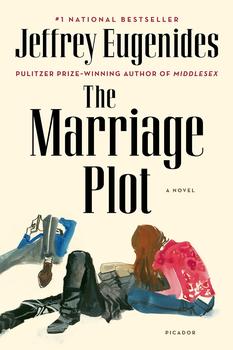Summary | Excerpt | Reading Guide | Reviews | Beyond the Book | Readalikes | Genres & Themes | Author Bio

A Novel
by Jeffrey EugenidesA Madman in Love
To start with, look at all the books. There were her Edith Wharton novels, arranged not by title but date of publication; there was the complete Modern Library set of Henry James, a gift from her father on her twenty-first birthday; there were the dog-eared paperbacks assigned in her college courses, a lot of Dickens, a smidgen of Trollope, along with good helpings of Austen, George Eliot, and the redoubtable Brontë sisters. There were a whole lot of black-and-white New Directions paperbacks, mostly poetry by people like H.D. or Denise Levertov. There were the Colette novels she read on the sly. There was the first edition of Couples, belonging to her mother, which Madeleine had surreptitiously dipped into back in sixth grade and which she was using now to provide textual support in her English honors thesis on the marriage plot. There was, in short, this mid-size but still portable library representing pretty much everything Madeleine had read in college, a collection of texts, seemingly chosen at random, whose focus slowly narrowed, like a personality test, a sophisticated one you couldn't trick by anticipating the implications of its questions and finally got so lost in that your only recourse was to answer the simple truth. And then you waited for the result, hoping for "Artistic," or "Passionate," thinking you could live with "Sensitive," secretly fearing "Narcissistic" and "Domestic," but finally being presented with an outcome that cut both ways and made you feel different depending on the day, the hour, or the guy you happened to be dating: "Incurably Romantic."
These were the books in the room where Madeleine lay, with a pillow over her head, on the morning of her college graduation. She'd read each and every one, often multiple times, frequently underlining passages, but that was no help to her now. Madeleine was trying to ignore the room and everything in it. She was hoping to drift back down into the oblivion where she'd been safely couched for the last three hours. Any higher level of wakefulness would force her to come to grips with certain disagreeable facts: for instance, the amount and variety of the alcohol she'd imbibed last night, and the fact that she'd gone to sleep with her contacts in. Thinking about such specifics would, in turn, call to mind the reasons she'd drunk so much in the first place, which she definitely didn't want to do. And so Madeleine adjusted her pillow, blocking out the early morning light, and tried to fall back to sleep.
But it was useless. Because right then, at the other end of her apartment, the doorbell began to ring.
Early June, Providence, Rhode Island, the sun up for almost two hours already, lighting up the pale bay and the smokestacks of the Narragansett Electric factory, rising like the sun on the Brown University seal emblazoned on all the pennants and banners draped up over campus, a sun with a sagacious face, representing knowledge. But this sun - the one over Providence - was doing the metaphorical sun one better, because the founders of the university, in their Baptist pessimism, had chosen to depict the light of knowledge enshrouded by clouds, indicating that ignorance had not yet been dispelled from the human realm, whereas the actual sun was just now fighting its way through cloud cover, sending down splintered beams of light and giving hope to the squadrons of parents, who'd been soaked and frozen all weekend, that the unseasonable weather might not ruin the day's festivities. All over College Hill, in the geometric gardens of the Georgian mansions, the magnolia-scented front yards of Victorians, along brick sidewalks running past black iron fences like those in a Charles Addams cartoon or a Lovecraft story; outside the art studios at the Rhode Island School of Design, where one painting major, having stayed up all night to work, was blaring Patti Smith; shining off the instruments (tuba and trumpet, respectively) of the two members of the Brown marching band who had arrived early at the meeting point and were nervously looking around, wondering where everyone else was; brightening the cobblestone side streets that led downhill to the polluted river, the sun was shining on every brass doorknob, insect wing, and blade of grass. And, in concert with the suddenly flooding light, like a starting gun for all the activity, the doorbell in Madeleine's fourth-floor apartment began, clamorously, insistently, to ring.
Excerpted from The Marriage Plot by Jeffrey Eugenides. Copyright © 2011 by Jeffrey Eugenides. Excerpted by permission of Farrar, Straus & Giroux. All rights reserved. No part of this excerpt may be reproduced or reprinted without permission in writing from the publisher.
We should have a great fewer disputes in the world if words were taken for what they are
Click Here to find out who said this, as well as discovering other famous literary quotes!
Your guide toexceptional books
BookBrowse seeks out and recommends the best in contemporary fiction and nonfiction—books that not only engage and entertain but also deepen our understanding of ourselves and the world around us.